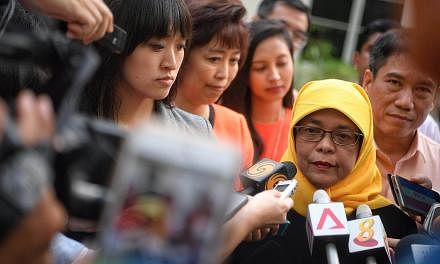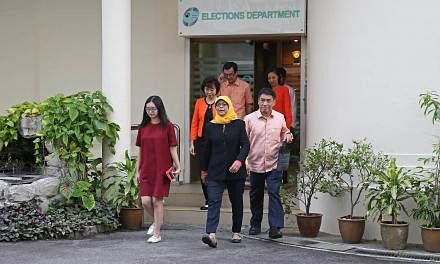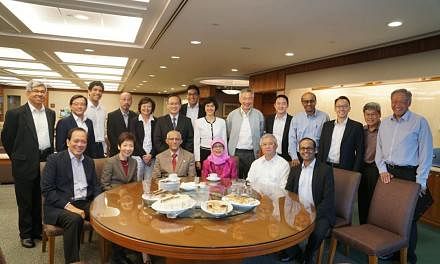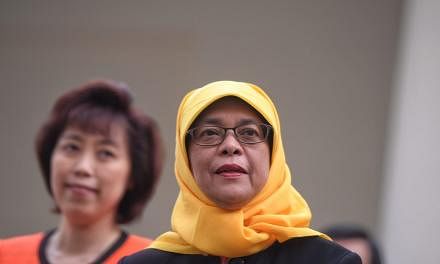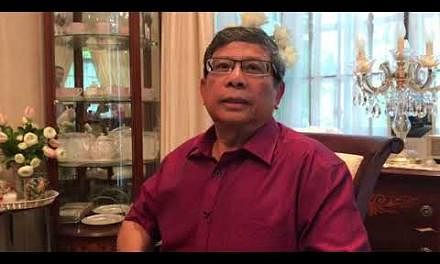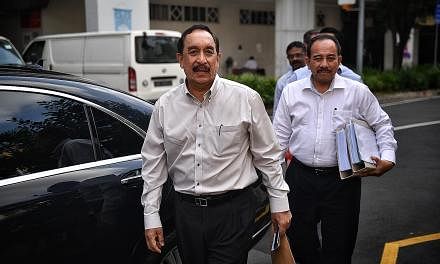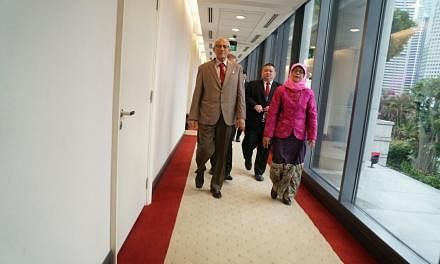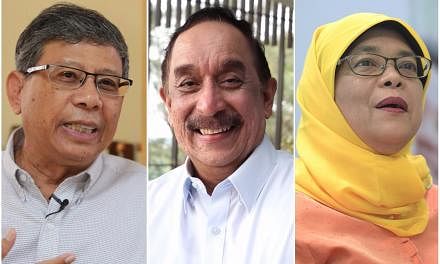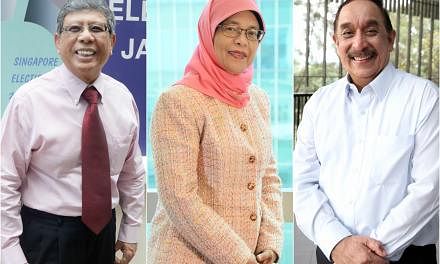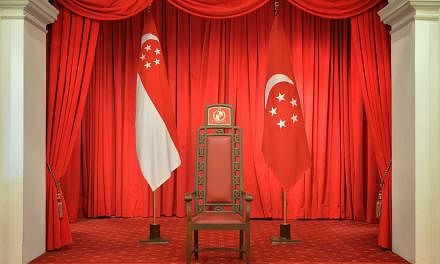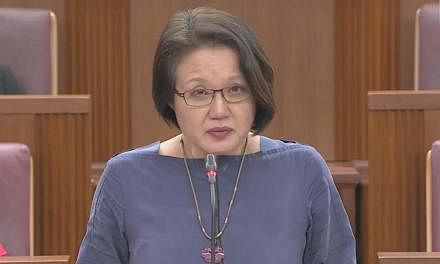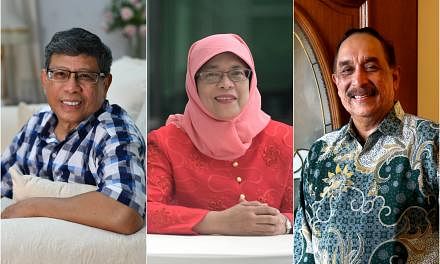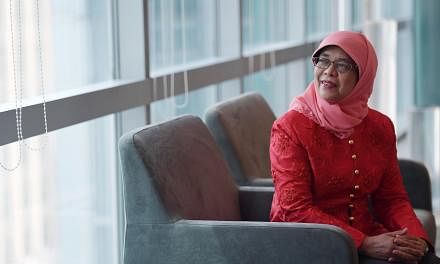Seasoned business owner no stranger to failure
Businessman Mohamed Salleh Marican is no stranger to failure. He has had several ventures fail but always dusts himself off and tries anew.
And so he is completely unfazed about the possibility of not succeeding in his boldest bid so far - running for the elected presidency.
The 67-year-old chief executive of listed Second Chance Properties does not automatically qualify for this September's election.
Private-sector candidates must have run a company with at least $500 million in shareholder equity. His investment holdings and retail firm had equity of between $254.3 million and $263.25 million over the last three financial years.
But he believes he can convince the six-member Presidential Elections Committee, which can admit candidates under a "deliberative track", that he has what it takes.
The father of four grown-up children told The Sunday Times in an interview at his Kew Crescent home last month: "Entrepreneurs by nature are a positive lot - they have to be, or they'd never start."
-
About the election
-
This year's presidential election, which will be held in September, is the first reserved election following changes to the law last year to ensure the presidency reflects Singapore's multiracial society.
Candidates must be from the Malay community, which has not been represented in the office since first president Yusof Ishak died in 1970.
The changes also update the criteria for candidates from the private sector.
They should have helmed a company with, on average, at least $500 million in shareholders' equity for the latest three years, and that made after-tax profits, on average, for the entire time they were in charge.
Applications opened on June 1, when forms were made available at the Elections Department website and its Prinsep Link office.
The final day for filing applications for certificates is the fifth day after the Prime Minister issues the Writ of Election in late August.
Aspiring candidates must apply for a certificate of eligibility, as well as a community certificate confirming that they belong to the Malay community.
The Presidential Elections Committee and Community Committee will assess whether they meet the criteria to contest. Both will have at least 10 days after the Writ is issued to assess applications.
Aspiring candidates will be told before Nomination Day whether they qualify.
Article 19B of the Constitution defines a "person belonging to the Malay community" as "any person, whether of the Malay race or otherwise, who considers himself to be a member of the Malay community and who is generally accepted as a member of the Malay community by that community".
As for private-sector corporate chiefs eyeing the post, they must submit financial statements on the value and profitability of their company, prepared according to accepted accounting standards.
Since applications opened, businessmen Mohamed Salleh Marican and Farid Khan Kaim Khan have declared their intention to contest the election.
Speaker of Parliament Halimah Yacob has also been cited as a potential candidate.
But Mr Marican also knows stepping up as a potential candidate can be challenging. He was criticised by netizens when he stumbled while trying to recall the Malay word for "running the company" on Facebook Live after he collected nomination papers last month.
"I expected negative comments, but I did not expect them to be so vicious," he said, adding that it was an opportunity to learn how to handle criticism.
He is pressing on with Malay-language classes, saying he regrets not starting on them as soon as he knew he wanted to run last November.
But, he said with a sheepish smile, he got caught up in work.
He is also assembling a campaign team. So far, it includes his younger brother Hassan, 63, the deputy chief executive at Second Chance.
Asked why he wants to be a candidate, he said: "I have done well, and I want to give back to society."
The office's position and influence have a "great impact" on the activities that he endorses, he said, adding that he is particularly drawn to helping smaller charities which have trouble raising funds.
If elected, Mr Marican, who said he has donated about $2 million over the last few years to various charities, will give his entire salary to small charities, especially those that focus on single mothers and young children, in memory of his mother who died in 2007.
He toyed with the idea of running for president as early as two years ago, but got serious after Prime Minister Lee Hsien Loong said last November he hoped qualified Malay candidates would step forward.
That was after it was announced that this year's election will be reserved for the Malay community.
Mr Marican did not want to be drawn in on the merits of other potential candidates, and would say only that should he be approved to contest, voters can decide for themselves.
He is proud of his non-involvement in party politics, saying he turned down invitations to join the Workers' Party before the 1984 general election, and the People's Action Party in 1990. He wanted to focus on his business, he said.
His determination to contest and succeed appears to stem from past setbacks. His father, an Indian textile merchant, died when he was 15, leaving his Malay mother, who did not work, to raise the children on her own.
They were never poor but he could see she was constantly worried that money would run out.
She moved the family from their 6,000 sq ft Woo Mon Chew Road bungalow to a 3,200 sq ft terrace in Jalan Selamat. Mr Marican, the third of six children and eldest son, was determined to become rich, so that he and his mother would never go through that anxiety again.
But his first four ventures, which started when he was 24, flopped. The first was when he used $30,000 - amassed from six years of saving money from national service and odd jobs - to set up tailoring shop M Salleh Enterprise in Peninsula Shopping Centre in 1974.
Mr Marican, who left Victoria School without taking his A levels - "I knew I was going to fail, so I wanted to cut my losses and get back as much of the exam fees as possible" - thought tailoring was simple. He soon found he did not know much about clothes-making.
To stem losses, he sold the shop for $15,000. Five months later, he bought it and its stock back for $8,000, when the person he sold it to also quit. Mr Marican called it Second Chance Tailor, to reflect his second shot. "It was also a Westernised name, easier for customers to remember."
In 1976, business was doing so well that he set up two more outlets. But he soon met new obstacles, and closed down one shop, sold another and left the original shop to his youngest brother.
He next dabbled in trading rare goods and luxuries to Saudi Arabia. But it was short-lived.
Returning in late 1977, he revived Second Chance Tailor. He spent $20,000 on cinema and magazine ads, when a tailor made that much in profit in a year.
He thought if he behaved like he was running a branded store, people would be more convinced on quality. "It worked," he said. "I got back all my old customers and many new ones."
The next year, he became one of the first home-grown tailors to sell ready-to-wear office clothes. By 1984, he had saved up his first million. By 1988, he had 25 shops - 18 here and seven in Malaysia. He won the first Businessman of the Year award from the Malay Chamber of Commerce and Berita Harian.
But the attention, he said, precipitated his next setback. He believes the publicity "exposed" the brand's local origins at a time when people still preferred foreign brands. Others also entered the ready-to-wear market, and he lost competitive advantage.
From 1989 to 1992, he closed 21 stores, and let most of his 140 staff go. He sold excess stock and goods at a loss - almost $2 million in total, close to what he had made the previous decade.
"That was the worst three years of my life. It was the opposite of hope. I was so worried about the staff and myself, the fear exaggerated itself in my mind."
His wife Sapiyah Abu Bakar, now 65, told him he need not be rich to be happy. The two met in 1971 at a birthday party. He proposed a year later, and married her two years after that.
Mr Marican did not let go of his desire to be successful. So began the next venture producing ready-to-wear ladies' baju kurung and kebayas, under the name First Lady.
He made a profit of $1 million in his first year. In 1993, he opened jewellery retail store Golden Chance. Within three years, it made $2.6 million in profits.
In 1997, his became the first Malay-owned company to list on the Singapore Exchange. "It was the proudest day of my life," he said. He raised $5.4 million in the initial public offering, intending to use the money to take his business abroad. But the Asian financial crisis hit and he ploughed it into property instead. Over the next few years, he bought $15 million worth of property, now worth about $200 million.
Renting out these commercial properties is the main source of his company's income today.
From grass cutter at 13 to big boss
Forced by a family tragedy to quit school in Secondary 2, Mr Farid Khan Kaim Khan became a grass cutter at age 13 to help his mother feed, clothe and educate his four younger siblings.
He was paid 70 cents a day.
That was in 1969.
Today, Mr Farid, 61, runs a regional marine services company with a reported shareholder equity of around US$300 million (S$413 million).
He attributes his success to Singapore's meritocratic system, which he wants to preserve. Coupled with a strong desire to give back to society, it has led him to make a bid to contest the elected presidency.
"I have just a Sec 2 education and was able to work my way up to where I am today through hard work. I don't think I would have achieved what I achieved if I were born in another country," he said.
Having to stop studying in Sec 2 "is one of my biggest regrets in life'', the chairman of Bourbon Offshore Asia said in an interview last Friday.
But, he noted: "The presidential election forms for candidates do not ask for highest educational qualification."
Education may not be a requirement, but experience in managing a company of sufficient complexity is. Amendments to the elected presidency require candidates from the private sector to have been the top executive of a company with at least $500 million in shareholder equity in the past three years.
Asked about this requirement, he said: "There are many ways to compute shareholder equity. Bourbon is one of the biggest companies in the world."
Bourbon Offshore Asia's reported shareholder equity of US$300 million is below the $500 million threshold that would qualify Mr Farid to contest.
Mr Farid told The Sunday Times that he began mulling over a bid in May. His family is supportive of it.
"But my wife is worried we will lose our privacy," he said. He recounted how people were taking pictures of them at Eunos Crescent Market and Food Centre after he announced his bid last week.
He lives with his wife, daughter and son in a three-storey bungalow in Eunos, bought in 2004. His daughter Raeesah Khan, 23, works in non-profit organisation Reyna Movement and his son Yusuf Khan, 18, is studying at the Institute of Technical Education College East in Simei.
Despite the change in his fortunes since his childhood, Mr Farid said: "I am not an extravagant person. I can live on very little. I eat at hawker centres and coffee shops."
He was in Secondary 1 in Bartley Secondary School when his father Kaim Khan died after a heart attack in 1968. The late Mr Kaim was aged 44 and working as a bus conductor with bus company Singapore Traction Company.
"I was doing very well in school, among the top three students of the class, but I had to stop studying because I was the oldest of five children," Mr Farid said.
"I had to help my mother provide for the family."
His mother washed clothes for families while he cut grass with a sickle. "There was no machine to cut grass in those days,'' he recalled.
He was to hold a string of blue-collar jobs subsequently. He was a lorry attendant for a wood factory that paid $1.20 a day.
"My job was to carry things onto and off the lorry."
To earn more money, he took on a second job at a petrol station in the evening to wash cars and toilets.
At 15, he found a job as an assistant mechanic at a workshop that repairs ship engines. It was the start of a love affair with the marine sector: "I had wanted to be a doctor. But after I stopped school, I decided to aim to be a marine engineer."
His mother remarried in 1973 and his stepfather, who owned a sarabat (drinks) stall at a coffee shop, helped improve the family's finances.
When Mr Farid turned 18 in 1973, he worked in a shipyard cleaning ships. On his 21st birthday, he joined local shipping company Lian Huat as a captain's steward.
"My mother objected," he recalled. His older brother drowned in 1959, at the age of seven. He had fallen off a bridge on his way home from school and died.
"My mother did not want me to be out at sea, but I successfully persuaded her to let me go.''
The hardest years of his life, he said, were between 1969 and 1976, when he joined Lian Huat. "I did not have qualifications and I took whatever job that was available," he said. "I was in survival mode."
But the tough years gave him grit: "I learnt not to give up."
With his sights set on being an engineer, he moved to Neptune Orient Lines (NOL) in 1979. In 1983, he completed a three-month course at the Singapore Polytechnic and qualified as a junior engineer.
At the polytechnic, friends introduced him to Ms Naeemah Shaik Abu Bakar, now aged 61.
They married in 1989 and moved into a four-room Housing Board flat in Hougang, which Mr Farid had bought with his mother in 1985.
He quit NOL after he got married and worked as an engineer for an Indonesian company that laid undersea pipes.
In 1994, Mr Farid moved to Jakarta after he joined Indonesian company PT Pelangi Niaga Mitra International, where he rose to be general manager in 2003. A year later, he returned to Singapore to run its operations here.
The following year, Mr Farid's regional experience attracted multinational Bourbon, which offered him the rare opportunity to launch its operations in Asia.
"They headhunted me," Mr Farid said. "They saw how I built the company Pelangi Mitra and wanted me as their partner in Singapore."
Bourbon Offshore Asia was born in 2005. The company provides marine services to shipping companies and he was its first managing director. He is now the company's chairman.
Mr Farid is of Pakistani descent, a fact that has led some to question whether he can represent the Malay community. He countered this by saying he speaks Malay, was born in a Malay village in Geylang Serai, practises the Malay culture and worships at Al-Abdul Razak Mosque in Eunos.
"We cannot change people's minds, but we can make them understand," he added.
"My ethnicity is Pakistani but I am part of the Malay community."
He has come up with a campaign slogan that he plans to use, should he qualify, based on the theme : Together We Build Our Nation.
One priority he would focus on, he said in announcing his bid last week, is to help counter the threat of radicalism by working closely with the Government and various groups to build trust among people of different races and religions.
Two years ago, a radicalised young Singaporean planning to fight in Syria was detained under the Internal Security Act, and the authorities found he planned to assassinate the President and Prime Minister if he could not travel abroad.
Asked how he feels running for a post that has been marked as a potential terror target, Mr Farid said: "If I cannot feel safe, other Singaporeans also cannot feel safe. I am not immune to the terror threat.
"That is why we need to build trust among the communities."

